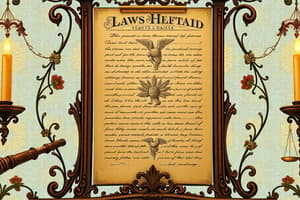Podcast
Questions and Answers
What is the primary purpose of the law of evidence?
What is the primary purpose of the law of evidence?
- To allow witnesses to testify without questioning
- To guarantee that evidence is reliable, relevant, and fair (correct)
- To exclude all types of evidence from court proceedings
- To ensure that evidence is presented in a timely manner
What type of evidence includes physical objects or documents?
What type of evidence includes physical objects or documents?
- Real evidence (correct)
- Testimonial evidence
- Hearsay evidence
- Circumstantial evidence
What is the requirement that evidence must be trustworthy and reliable?
What is the requirement that evidence must be trustworthy and reliable?
- Exclusionary rules
- Materiality
- Relevance
- Reliability (correct)
What is the obligation to present evidence to support a claim?
What is the obligation to present evidence to support a claim?
What is the level of proof required to meet the burden of persuasion?
What is the level of proof required to meet the burden of persuasion?
What is the ability of a witness to testify based on factors such as age and credibility?
What is the ability of a witness to testify based on factors such as age and credibility?
What is the primary purpose of impeachment in a legal case?
What is the primary purpose of impeachment in a legal case?
What type of evidence is excluded by the hearsay rule?
What type of evidence is excluded by the hearsay rule?
What is the primary difference between a presumption and an inference?
What is the primary difference between a presumption and an inference?
What type of privilege allows a lawyer to refuse to disclose certain information?
What type of privilege allows a lawyer to refuse to disclose certain information?
What is the purpose of exclusionary rules in a legal case?
What is the purpose of exclusionary rules in a legal case?
Flashcards are hidden until you start studying
Study Notes
Definition and Purpose
- The law of evidence is a set of rules that govern the admissibility of evidence in a legal proceeding.
- Its purpose is to ensure that evidence presented in court is reliable, relevant, and fair.
Types of Evidence
- Real evidence: Physical objects or documents that are relevant to the case.
- Testimonial evidence: Statements made by witnesses.
- Circumstantial evidence: Indirect evidence that implies the existence of a fact.
- Hearsay evidence: Statements made by someone other than the witness, offered to prove the truth of the matter asserted.
Admissibility of Evidence
- Relevance: Evidence must be relevant to the case and have a tendency to prove or disprove a fact.
- Reliability: Evidence must be trustworthy and reliable.
- Materiality: Evidence must be relevant to a material issue in the case.
- Exclusionary rules: Rules that exclude certain types of evidence, such as hearsay or privileged communications.
Burden of Proof
- Burden of production: The obligation to present evidence to support a claim.
- Burden of persuasion: The obligation to convince the trier of fact of the truth of a claim.
- Standard of proof: The level of proof required to meet the burden of persuasion, such as "beyond a reasonable doubt" or "by a preponderance of the evidence".
Witnesses and Testimony
- Competency: The ability of a witness to testify, based on factors such as age, mental capacity, and credibility.
- Privilege: The right to refuse to testify or disclose certain information, such as attorney-client communications.
- Impeachment: The process of attacking a witness's credibility.
Exclusionary Rules
- Hearsay rule: Excludes statements made by someone other than the witness, offered to prove the truth of the matter asserted.
- Exclusion of irrelevant evidence: Excludes evidence that is not relevant to the case.
- Exclusion of privileged communications: Excludes evidence that is protected by a privilege, such as attorney-client communications.
Presumptions and Inferences
- Presumptions: Conclusions that are assumed to be true unless disproven.
- Inferences: Conclusions that can be drawn from the evidence.
- Permissive inferences: Inferences that may be drawn, but are not required.
- Mandatory inferences: Inferences that must be drawn.
Studying That Suits You
Use AI to generate personalized quizzes and flashcards to suit your learning preferences.



